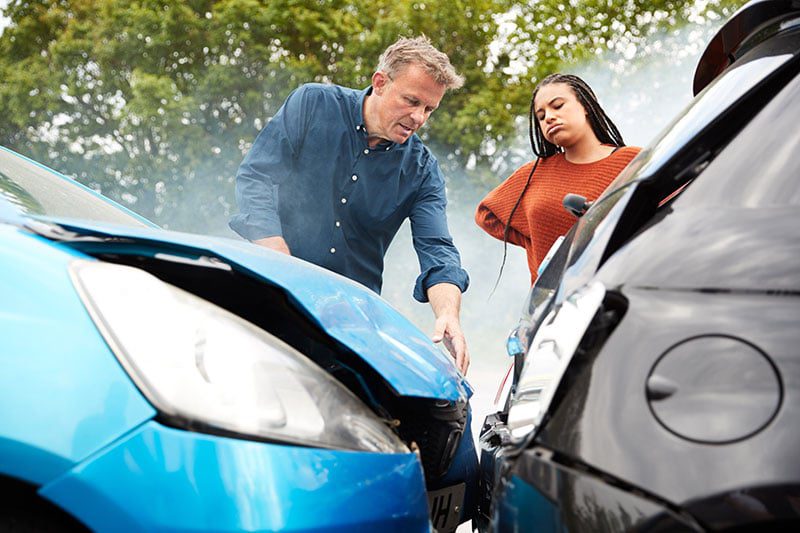Car accidents, whether you are at fault or not, can be a time-consuming hassle for many people. For you to properly handle the situation, you must perform your due diligence. That means gaining all of the vital information, following up with the right people, and doing what is necessary to protect yourself.
In this article, we will examine what to do after a car accident that is not your fault.
We will explain the process, who you need to contact, and the insurance implications. Your time gets taken from you when you deal with an accident, and you don’t want your money to be taken from you as well.
Gather the Necessary Information after an Accident
After the accident happens, make sure to approach the situation in a professional manner. It is best to leave all emotions out of the case, which will allow you to gather facts in an objective, efficient way.
When speaking with the other driver, make sure to be polite. Do not yell or shout, and let the other person get their thoughts out clearly.
Be very diligent in gathering information related to the accident.
These findings can get utilized for the insurance claims, and the police will ask questions to both parties when creating the police report. Everything you write down can be used as evidence and will support your position when retrieving your compensation for the accident and any damages.
The information that you should get from the other driver includes:
- his or her full name
- address
- name of the insurance company
- and policy information
If you want, you can take a picture of the insurance card so no data will get misconstrued. If the other driver agrees to it, you can get a statement about the accident as well.
Pictures are also an essential aspect of documentation.
Most smartphone cameras will take quality pictures that are good to be used for investigation and insurance claim purposes. Do not just take a picture of where you think the damage occurred.
Snap pictures of everything, including:
- Your vehicle from all the angles
- The other person’s car from all angles
- Impact spots on both automobiles
- The accident scene from an all-encompassing distance, including street signs, landmarks, and traffic lights
- The other party’s insurance card
If you fill this checklist of information items, you will have a strong case for your position when you talk with insurance companies.
For a not-at-fault accident in a rental car, you will need this information when speaking with the rental company. Also, confirm to see if your insurance provider has a mobile application in place for these types of events. More companies are including a checklist within the phone application.
Someone hit my car, whose insurance do I call?
After gathering the necessary information from the accident firsthand, you will need to contact the appropriate insurance companies. This step is essential if you want to have the best chance of recovering your damages. The providers will take both parties’ reports into account, as well as the police report.
Do I call my insurance if the car wreck is not my fault?
Whether it is a car accident in which you are at fault or not, make sure to contact your own insurance company. Doing this creates a good-faith effort when reporting the accident. There is always the chance that the other party’s insurance provider will deny taking responsibility for the crash. If this happens, you will have to file a collision claim.
Should I talk to the other insurance company after an accident?
It is also important to contact the other party’s insurer and tell them that you got into a crash with a policyholder of theirs. The most important thing to remember here is to be objective and report only the concrete facts of the accident. Make sure to remain neutral and state what happened respectfully.
Do NOT sign any papers or agree to a written statement before you talk to a car accident lawyer about your case.
Getting Medical Care After a Car Accident
You might not feel any severe pain right after an automobile accident, but symptoms can arise many days later for you.
Several days afterward, pay close attention to any pain you feel in the back or neck. Look closely for any discomfort in your abdomen or various swelling.
Other symptoms include dizziness, headaches, nausea, vomiting, seizures, or numbness. Also, note any changes in your personality. Even if any of these symptoms is not completely obvious, make sure to seek the opinion of a doctor. Because the accident is not your fault, you will not be responsible for the medical bills.
The personal injury lawyers at Stoy Law Group can recommend and get you medical help without any money out of your pocket. Our team can also arrange transportation if your vehicle is no longer safe for the road.
For personal injury claim purposes, make sure to keep an organized record of any bills, prescriptions, or statements. These accounts of you visiting the doctor and receiving medical attention because of your accident will help determine how much you should be compensated in the future.
The Insurance Companies Are Not Your Friend
After speaking with the at-fault driver’s insurance provider, there is a small chance they will tell you to look for payment from your insurer. The other driver’s company might claim that there is no evidence of the accident, even though it is obvious.
Insurance adjusters sometimes are not 100% truthful when it comes to reporting all the facts an options for you following an accident, especially those who represent the opposite driver.
Insurance adjusters work for an insurance company and are responsible for reviewing details of a crash. They then calculate the accurate payment processes and who should provide monetary damages for the accident.
The adjuster will conduct interviews with the person who creates the claim and other witnesses. Regardless of whether the other driver is at fault, the representative will work hard to vouge for the client. Make sure to be aware of the various ways that he or she will attempt to deny or reduce the claim on behalf of his or her client.
The tactics begin with the claims adjustor trying to take advantage of the claimant (you). He or she will try and recommend that you are better off not needing an attorney, which is terrible advice.
Make sure to reach out to your local personal injury attorney, who will help aid you through this claim process and bring a skilled negotiation experience for you.
How does car insurance work when you are not at fault?
A lawyer will serve as your resource for navigating through the insurance laws. If the other person’s insurance company is giving you a difficult time with your claim and not properly compensating you, contact Stoy Law Group. You might think of additional questions about your legal alternatives, and your attorney will give you genuine advice in your best interest.
Besides clarifying any issues you might have, the legal representative will give you consultative advice on what course of action to take if things are not yet figured out.
Firms like Stoy Law Group can help you with all types of automobile wrecks, even when your car totaled not at fault.
Do I have to pay my insurance deductible if the accident was not my fault?
Initially, you will need to pay your insurance deductible for your automobile shop trip. But if your insurer accomplishes a settlement with the other driver’s insurance provider, you will get the money back.
If the other driver does not have insurance in place, that does not necessarily mean you will not get anything. If you have uninsured motorist coverage property damage (UMPD), there will be no deductible, and you can make a claim through this option.
Navigating the insurance can be confusing and very time-consuming. Hiring a law firm on a contingency fee basis, will allow your attorney to take complete control of your claim.
Do insurance rates go up after an accident when it is not your fault?
When renewal time rolls around, your rates will not rise. If you make a claim on your insurance for an accident that was not your fault, the insurance company will analyze and determine that you are not at risk. There are systems in place to make sure your rates are reflective of your risk on the road.
Most state laws prohibit insurance companies from increasing prices for this reason.
Contact Stoy Law Group after a Car Accident
As you can see, you can protect yourself from potential damages if you are diligent at collecting accurate information, objectively reporting the facts, and following up with all of the resources available to you. Now you know what to do after a car accident that is not your fault.
Throughout this entire process, it is vital to take care of yourself as well. You want to make sure you are compensated for your car damages but do not lose sight of your health in the process. It is important to get a chiropractor or doctor that will be honest with you and look out for your best interest.
In a perfect world, you should notify the other insurance company, drop your car off at the auto repair shop, visit the doctor, and have everything paid. This situation should also apply when your car is totaled, and you are not at fault.
With a reliable lawyer representing you and helping you deal with uncertainty, you can rest assured that you will be in the best position to get the best health care and proper compensation.
Submit the free case evaluation form or contact Stoy Law Group to discuss your car accident today.














